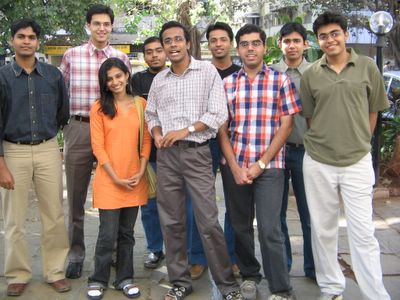There aren't many politicians in the BJP I would say I'm particularly fond of, but my least favourite would have to be Lal Krishna Advani – chief architect of the Babri Masjid demolition, chief supporter of the genocidal Narendra Modi regime in Gujarat and chief proponent of the blatantly unconstitutional Hindu Rashtra school of thought. As Deputy PM in the Vajpayee government, the "compulsions" of the coalition era thankfully forced a dilution of his hardline agenda, but now as the NDA occupies the opposition benches, he seems to be returning to the inflammatory, issue-devoid brand of politics he made famous in the 1990s. No more soft stands and tip-toeing around demanding allies for LK; it's back to yatras, rallies and plenty of hollow rhetoric.
Two recent events are testimony to this. First, of course, is la'affaire Modi. No sooner was the Gujarat Chief Minister sent back empty handed by the US visa authorities, than a "Swabhimaan Rally" was convened in Ahmedabad. With Advani presiding over proceedings, Modi predictably bellowed his lungs out to a hastily cobbled together saffron-clad audience. The visa denial, he would have everyone believe, was not just the rejection of an individual, but an insult to all five crore Gujaratis. Advani, not one to be left out when such occasions present themselves, piped in with a few sanctimonious words as well, more or less to the same effect as those of Modi. After all was said and done, the "hurt" leaders motored off in their riot-proof vans, satisfied at having skillfully utilized a terrific opportunity to whip up local passion and fervour. And whip up passions they sure did – the next few hours saw the American visa offices in the city targeted and effigies of George Bush of all people burning on the streets. BJP leaders, of course, distanced themselves from these goings-on, conveniently labeling the turn of events as “public outrage” and a “spontaneous reaction”. Disgustingly irresponsible and chillingly reminiscent of their attitude in February 2002, when the streets of Gujarat burnt in the worst state-sponsored pogrom India has ever seen.
Advani clearly wasn’t satisfied by this cheap attempt at making quick political gains and finding some reason to stay in public memory. He had a shocking statement on the economic front up his sleeve as well – the refusal to comply with VAT. Barely a week before the entire country was to come under the umbrella of the value added tax system, the Advani-led BJP think-tank announced that the states ruled by their party will not comply with the new policy. This is outrageous to the say least, because it was under the BJP finance ministers of the NDA regime – Jaswant Singh and Yashwant Sinha – that the idea of replacing the existing sales tax system with the more transparent VAT was first born. In fact, it was they who set the April 1 2005 deadline for the implementation of VAT across the country, before they were voted out of power last year. The new FM appreciated the economic sense VAT makes and released a white paper on the subject, which amongst other things promised that the deadline will be adhered to. All seemed on course till the BJP changed its mind. Their reasons: traders will be adversely affected and states will lose revenue in the short run. The traders issue seems to have been blown out of proportion – an honest trader under VAT will not only pay less tax on the whole, he will also be able to establish his bona fides better as every transaction will be documented, thereby insulating him to a large extent from harassment by tax officials. Of course, a dishonest trader will stand to lose a lot under the new system and so it should be. The catch is that the trading community forms a sizable chunk of BJP loyalists, and by opposing VAT the party is merely appeasing its vote bank. As far as loss of state revenue is concerned, Advani and co seemed to have missed the fact that the centre has assured all states that any short term deficits incurred due to VAT will be compensated. And, as the Haryana example shows, in the long run VAT results in significant revenue gains.
Advani, as the leader of the opposition, must hang his head in shame for the kind of disruptive political opportunism he and his partymen have indulged in ever since they’ve been vacated from government. The role of the opposition to ensure the effective functioning of any democracy cannot be ignored. But opposition for the sake of opposition – an art the BJP appears to have perfected – is detrimental to any sort of progress. The only reason why one can be satisfied that the BJP is in the opposition, is that they would probably have been much worse in government.






